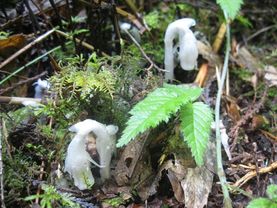 There are a few overlaps, and many differences between Herbalists and Naturopaths. It can sometimes be difficult and confusing to choose the right health care provider when faced with a growing number of alternative and integrative practitioners available. The following is a brief(ish) overview of the differences between these two common health care modalities. The most extensively trained of the alternative health professions tend to be Naturopaths, as they receive a similar degree of training as Medical Doctors and hold the title of “Dr.” or “ND”. They are able to diagnose, prescribe pharmaceuticals, and order blood tests, x-rays, and other scans. Because of this, they are required to write a licensing exam and in BC are covered by many medical benefits plans. Naturopaths are trained in a variety of modalities including acupuncture, homeopathy, and botanicals, though, aren't specialists in these areas. Their training will spend a few months on each subject rather than the years covered by specialists in any of those modalities, While naturopaths dabble in herbal arts, Herbalists are the specialists in botanicals. They are extensively trained in Herbalism, which includes modern science of medicine and herbs, as well as herbal traditional use and philosophy. There is an emphasis on holistic care, not absent in naturopathy, which means that diet and lifestyle habits are of just as much (if not more) importance as the herbs that are used. Why See an Herbalist Over a Naturopath? Naturopaths are very good at diagnosis, though unless they seek training outside of their naturopathic training, generally have a minimal or very basic understanding of herbal medicine. This is because although they are trained in it, they get merely a few months of training whereas herbalists will have years. Although every Naturopath practices in their own unique way, many will have an emphasis on supplement use and ‘nutraceuticals’ (that is, concentrated extracts of herbs). This is different than how herbalists practice, as herbalists tend to use whole herb preparations and (many) feel the whole herb extract is preferable for a variety of reasons both scientific and philosophical. Many people will see a Naturopath initially for a diagnosis, and to explore treatment options, and after switch to an herbalist to pursue long (or shorter) term herbal treatment. They may also choose to see both a Naturopath and an Herbalist as they can work together very effectively. Herbalists are really good at choosing the herbs that are right for the individual, as they are versed in a far wider variety of herbs then most Naturopaths and have a far deeper understanding of the breadth of activity in each herb. They also have a good understanding of the way that herbs interact with each other, and with pharmaceuticals, and supplements. This is important as herb/drug/nutrient interactions can alter desired effects or even be dangerous. When pursuing herbal treatment for any reason, it can be far more beneficial to work with an Herbalist than with a Naturopath.  Why Use Herbs at all? Many are safe to use long term and work wonderfully alongside conventional (or otherwise) treatments. Conventional medicine (pharmaceuticals) really excel at dealing with acute conditions and symptom management - despite what various blogs and articles tell you, you aren’t going to find an herb that takes a headache away as quickly as Tylenol does. Though If you suffer from chronic pain for example, daily use of Tylenol can quickly deteriorate the health of your liver. There are many herbs that taken daily over the course of weeks or months will manage your pain, often to the point of not having to take harsh pharmaceuticals at all. (That being said, stronger herbs are available to deal with severe pain when necessary and appropriate). If you feel most comfortable using conventional medicine, herbs work really well alongside pharmaceuticals to negate the damaging effects they can have on your liver and kidneys and protect against other side effects. They give us tools that conventional medicine simply doesn't have Unlike conventional medicine, herbs truly shine when it comes to treating chronic conditions. Herbs are slower acting and have a cumulative effect, meaning they work best when taken daily over time, but they give us many options for resolving long standing issues over simply treating the symptoms. Although they take time to produce an effect, when used properly herbs usually aren’t a life sentence; as they work to restore balance in the system where the problem is stemming from. Aside from treating chronic conditions, there are many safe (and delicious) options for treating more acute conditions such as helping to resolve a flu more quickly, or using sedative herbs to get to sleep. Herbal medicine has a lot of tools for things that conventional medicine simply doesn’t. You can’t go to your doctor with the complaint of “I just don’t feel that great” and expect to get much help aside from eating better and getting more sleep (and that’s if your doctor is especially progressive). There are herbs that are able to help your body to better deal with stress, heal more quickly after surgery, or lift your spirits. It’s impossible to list the variety of conditions that herbal medicine is used for - so if you’re wondering if you can benefit, the answer is yes - even if it’s not curable, your quality of life can certainly be effected (for the better).
1 Comment
julande marc
10/6/2020 05:59:51 am
i would to know more about herbs
Reply
Leave a Reply. |
Musings
Thoughts, discussions, learnings, about various aspects of herbs and healing. Archives
June 2020
Categories |
Proudly powered by Weebly
 RSS Feed
RSS Feed